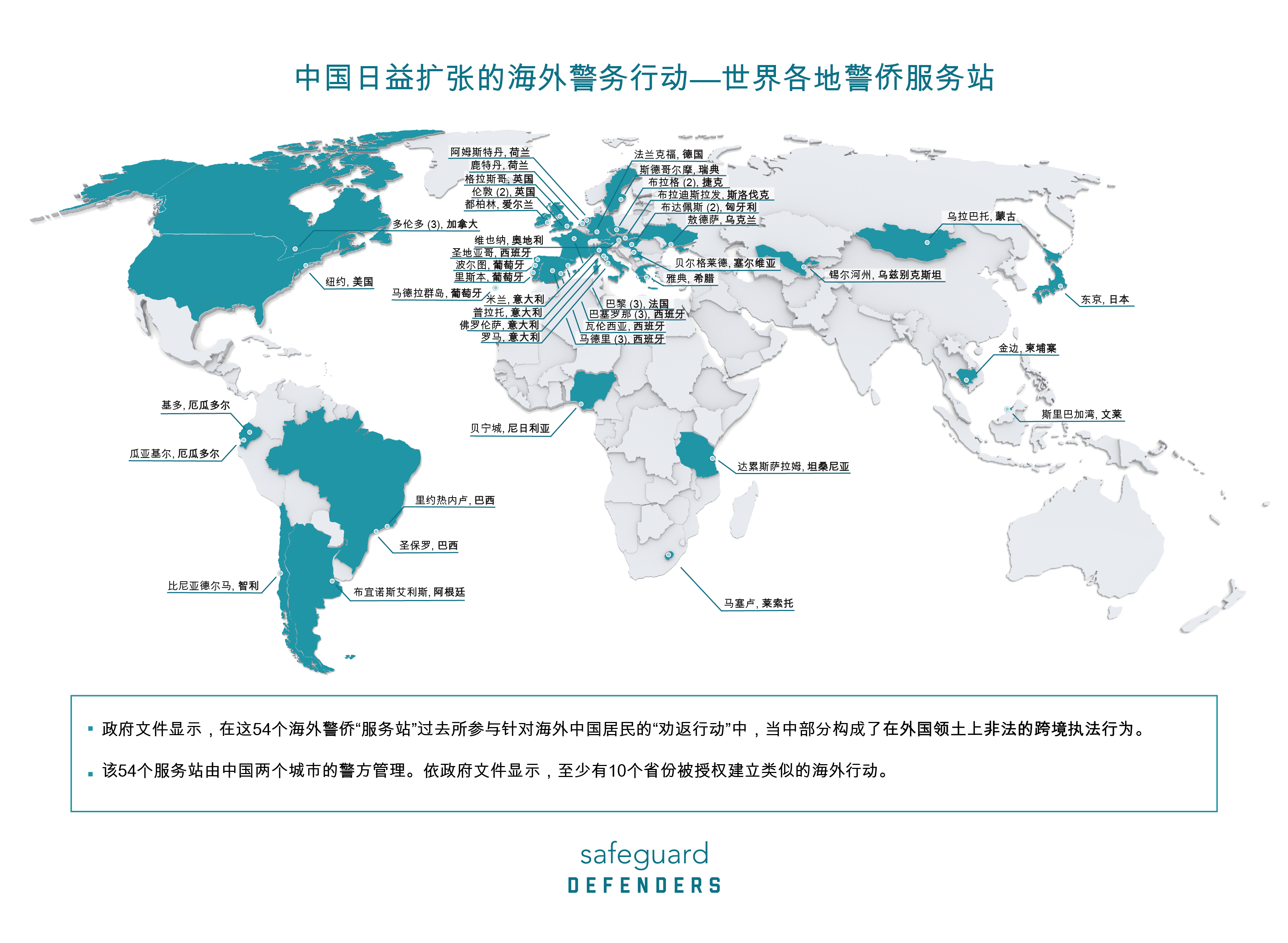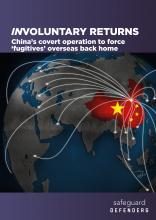23万中国人被从海外“劝返”,中国将建立治外法权
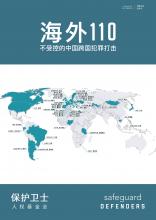 保护卫士调查系列的最新报告《海外110》,通过研究中国几个省份最近开展的打击跨国电信和网络诈骗(根据省级官方声明)的活动,深入探讨了中国警方不断扩大的全球警务行动。
保护卫士调查系列的最新报告《海外110》,通过研究中国几个省份最近开展的打击跨国电信和网络诈骗(根据省级官方声明)的活动,深入探讨了中国警方不断扩大的全球警务行动。
这项调查虽然篇幅简短,仅有18页,但揭露了五个要点:
- 2021年4月至2022年7月期间,中国警方 "劝返 "23万名声称的逃犯 "自愿 "返回中国(同时承认并非所有劝返对象均犯有罪行)。
- 在五大洲建立了54个由中国警方管理的 "海外警侨服务站",其中一些牵涉到与中国警方合作在外国领土上开展警务行动(包括在西班牙)。
- 建立了九个禁止国家,除非有 "充分的理由",否则中国公民不得在这些国家居住。
- 制定新规为“劝返”方法提供背书,包括以“株连“的做法剥夺目标人物在中国的子女受教育的权利,以及对家庭成员和亲属的其他限制等,惩罚那些完全无辜的人。
- 9月2日通过、12月1日生效的一项新法律规定,对于某些罪行(诈骗、电信诈骗、网上诈骗等),对全球的中国人和外国人具有完全的治外法权。
下载完整调查报告(PDF),了解更多信息,数据,地图,图表和其他资讯
对于此类海外行动,中国避开了利用国际警察或司法合作机制——这些机制规定了针对目标权利保护的控制机制,包括公平审判权和判决前的无罪推定,而是利用来自当地公安部或检察院的地方官方声明和规定,强调大规模使用“劝返”的做法。
根据此类声明,仅在2021年4月至2022年7月间短短15个月内(尽管有新冠大流行的限制),就有数量惊人的23万名中国公民通过这些方法被遣返回中国面临潜在的刑事指控,这些方法往往包括对国内家庭成员的威胁和骚扰,或通过网络或物理手段直接对国外的目标进行威胁和骚扰。
《海外110——中国失控的跨境执法》追溯了中国于2018年开展的10个 "试点省份 "运动的起源。官方指导明确列出了为 "劝返"目标人物自愿返回中国受审可采用的不同方式。这些手段包括针对所谓的嫌疑人在中国的子女,剥夺他们受教育的权利,以及以类似方式针对家庭成员和亲属。简而言之,这是一种完全的 "株连"惩罚以规劝嫌疑人从国外返回中国。
保护卫士组织2022年1月的报告《非自愿回国》中充分描述了这些工具及其目的,该报告审查了中国针对重点目标嫌疑人所开展的天网行动(以及其下属的猎狐行动)。
这次调查中呈现的最新文件表明,中国地方警察和司法当局在国外的行动中也越来越多地使用这些方法,显现出一个非常危险的趋势。
对劝返目标最低限度司法保障的绝对缺乏,对他们家人采用株连做法,以及采取非法手段规避正式国际合作机制,并利用与统战有关的海外组织来协助其行动,这些都对国际法治和领土主权构成最严重的风险。
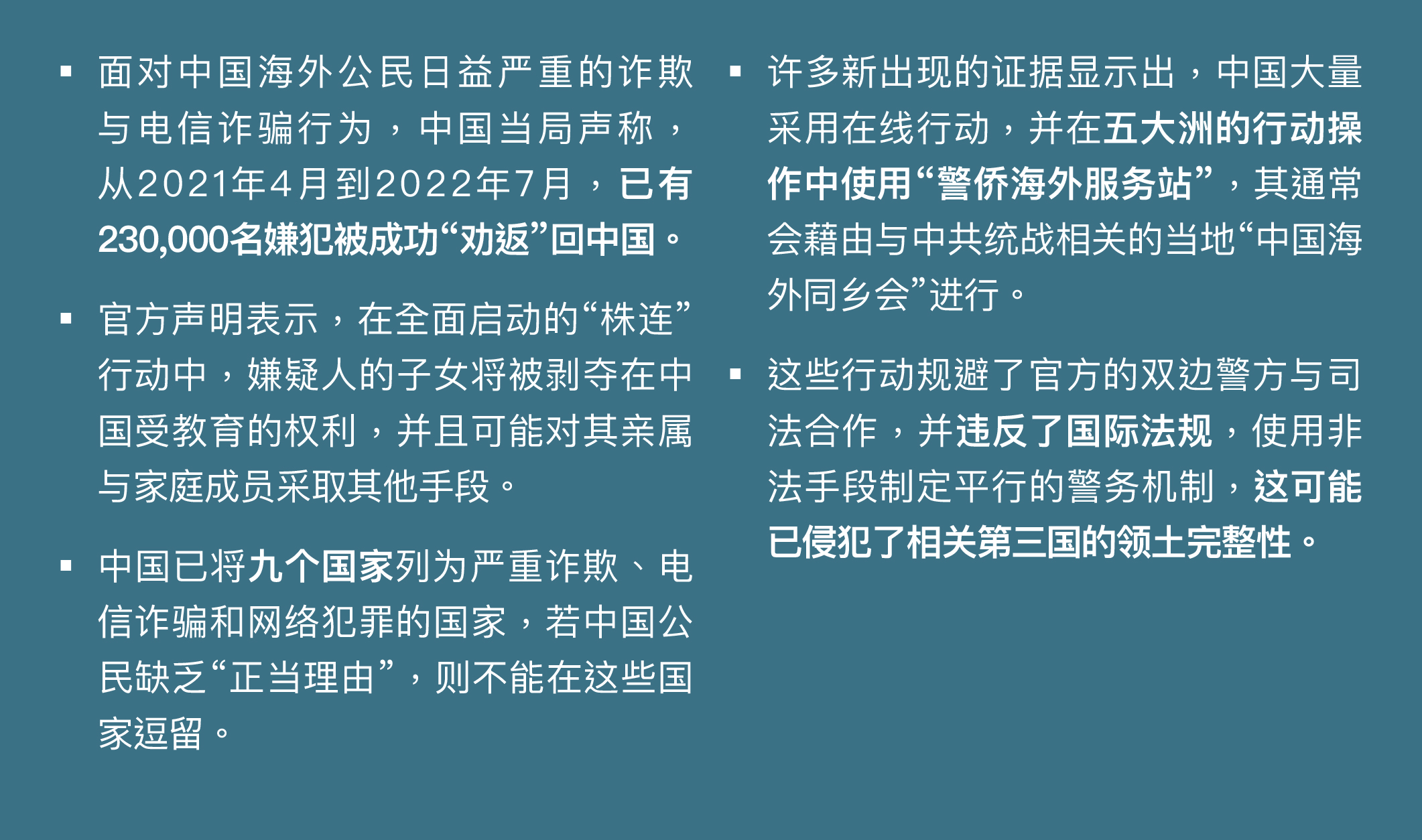
下载完整调查报告(PDF),了解更多信息,数据,地图,图表和其他资讯。
在保护卫士的报告《非自愿回国》中了解更多关于 "劝返 "相关方法的介绍, "劝返 "行动被归类为非自愿回国的方法一(偶尔是方法二)。
2022年9月2日,国家《反电信网络诈骗法》获得通过,确立了对全球所有中国公民在追究诈骗、电信和网络诈骗时的治外法权主张。
九个禁止国家
在该行动中,根据当地的紧急通知,指定 "九个国家"禁止中国公民前往或居住。该做法显现当局在打击中会采取极端的手段,该规定预先将每个人都视为嫌疑人,直到证明其无罪。
一名警察公开表示,即使不是所有居住在缅甸北部的中国人都是罪犯,他们仍然会被当作 "劝返 "行动目标。警方进一步承认,他们实际上并没有证据表明所有被列为目标的人都犯有任何罪行。
虽然没有关于23万人被遣返的官方分类,但大多数人似乎来自这九个被禁的国家,其中缅甸在2021年1月至9月期间被遣返的人数为5.4万人。
最近几个月,证据表明试点城市的“成功”正迅速导致该行动在真正的全球范围内扩张。
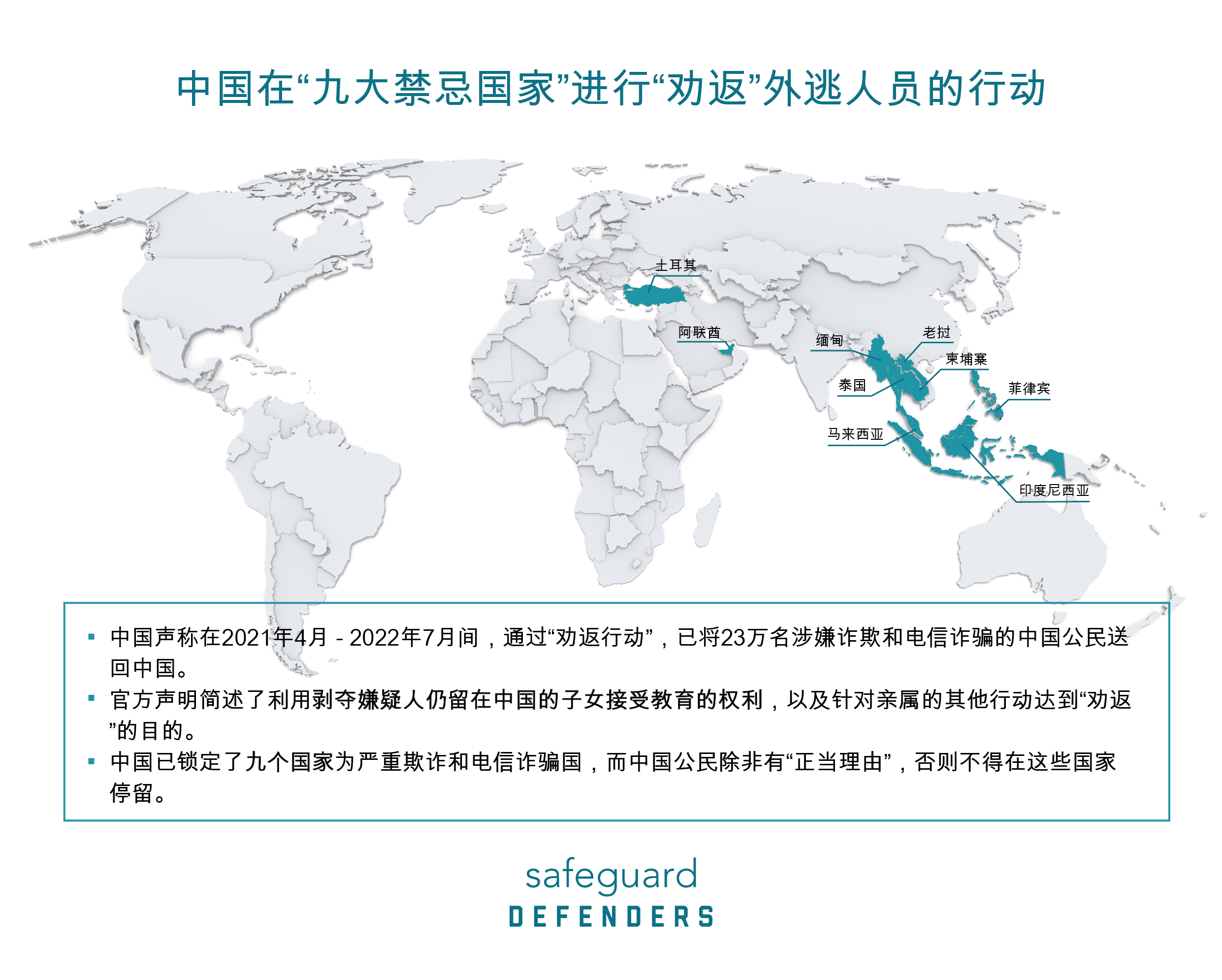
海外110
在过去的一年里,进一步的证据显示,至少有两个城市的警方通过与当地与统战有关的同乡会合作建立 "海外警侨服务站",积极开展这种长臂执法行动。
统战系统(统战部)是中共机构在中国境内外寻求收编和影响 “代表人物 ”和团体的工作,尤其是宗教、少数民族和侨民社区。——Alex Joske
设立海外服务站主要是为了执行一系列看似行政性的任务,以帮助居住在海外的华人社区,但它们也有更阴险和完全非法的目的。虽然迄今为止的证据表明,大多数跨国执法行动是通过国内运营的 "海外服务站 "的在线工具进行的,但一些官方行动的轶事明确指出,同乡会在当地积极参与跟踪和追捕中国当地公安局或检察院指明的目标。
《人民公安报》刊登《探索爱侨护侨助侨机制,设立警侨驿站海外服 务中心 青田警方积极打造 "枫桥经验 "海外 版》一文,报道了青田县公安局在巴塞罗那、马德里,罗马、米兰,巴黎,维也纳等 15个国家21座城市“创新设立警侨驿站海外服务中心”。在“国内联络中心”的协调下,“聘请135位青田籍侨领、侨团 会长为中心主任、副主任、联络员”并“组建 了1000余人的海外网格服务信息员队伍”。
“通过建设海外服务中心,青田警方海外追 逃工作实现新的突破,刑事案件打击架构得 到进一步优化。2018年以来,他们成功侦破 涉侨刑事案件6起,通过“警侨联办”协助抓 获在册红通人员1名、规劝投案自首2人。”
至少有两起这样的案件发生在欧洲本土:根据中国官媒的报道,海外警侨服务站积极协助中国警方在西班牙和塞尔维亚开展 "劝返 "活动。
根据迄今为止收集到的公开资料,在五大洲的30个国家中发现了54个实体的 "海外服务站"。由于这些只是代表福州和青田县设立的站点,总数量很可能更高。
由福州公安局将其管理的海外警侨服务站称作 "海外110",110是中国的报警专线,由此启发了这次调查的标题。
